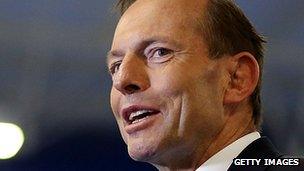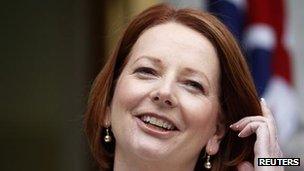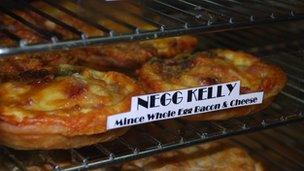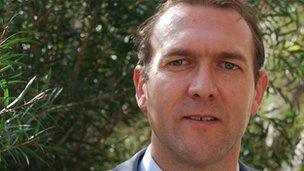Australia's leaders go to the dogs over carbon tax row
- Published

Tony Abbott... without any canine friends
Australia introduces a carbon tax on 1 July. It's the product of a bitter political debate within the country.
The government has said pricing carbon in this way is vital in order to fashion a clean energy economy, but opponents say it's as unnecessary as it's expensive and it won't affect climate change.
For the most part the discussion has been reasonably well-informed, although loftiness has often given way to infantile discussions of the complex issues involved.
An example of the latter surfaced last week, as the introduction of the tax loomed.
That's because of a highly publicised visit to a dog kennels by the leader of the opposition, Tony Abbott.
In front of an assembled group of pooches, paparazzi and politicians, Mr Abbott made the point that the RSPCA, one of Australia's most popular and respected charities, faces increased electricity bills due to the carbon tax, yet will receive no compensation.
It was a clever, photogenic, if somewhat laboured attempt at further discrediting the tax in the mind of an already-confused public.
Spin doctors, (or perhaps spin vets?), in other countries may have baulked at using dogs in the pursuit of a political agenda, but Mr Abbott pressed on, convinced the doe-eyed, slobbery animals at his side were just the tool needed to make his point.
"The prime minister loves to say that only the so-called big polluters will pay the carbon tax. That is just dead wrong,'' said Mr Abbott, clutching one particularly charming mutt.
'Scaring animals'
It didn't take long for the prime minister to scent the weaknesses in Mr Abbott's stunt.
By the time the day's business moved to parliament a few hours later, Julia Gillard had fully primed her punchlines in response to what she saw as an absurd attempt by Mr Abbott to frighten people.
Deploying her highly-effective deadpan delivery style the Prime Minister was withering.
The fear campaign, Gillard said, had ''moved on from human beings and now he's trying to scare animals… telling poor old Fluffy and Fido about how a cobra or a python is coming to get them''.
She went on: ''I can tell the Leader of the Opposition, on the first of July, cats will still purr, dogs will still bark and the Australian economy will continue to get strong.''
Statistical battle
In the past 12 months, the carbon tax has dogged Australia's political scene at every step.
At its heart, the government wants to impose a 23 Australian dollars ($23.60; £15) per tonne levy on every large company that pollutes.

Julia Gillard was quick to respond to Mr Abbott's visit to a dog kennels
The idea is to penalise them enough to encourage them to change their habits and shift towards alternative, non-fossil fuel ways of powering their businesses.
The government says Australia is, per capita, the world's biggest producer of CO2. It also says the country is in the top 20 of all polluters.
The opposition have taken issue with this, not so much on the science of a warming planet, but on the cost and logic of the government's method of tackling it.
Mr Abbott and his colleagues argue that as Australia only produces 2% of all the world's CO2, that hardly qualifies it as a mucky member of the global club of nations.
They also say 23 dollars per tonne is expensive and will lead to companies cutting back on jobs.
'Social responsibility'
There is some truth that businesses will suffer under the extra burden of tax.

Simon Bradbury says the new tax will require him to sell more pies
"I will have to sell an extra 8,000 pies to make up the difference," says Simon Bradbury, owner of the Stockade Pie Shop in Campbelltown, New South Wales.
"All my suppliers will pass their costs on to me and I will have to pass them onto the customer," he says. "The carbon tax is a bad idea for people like me just trying to earn a living."
An even bigger pain will be felt by larger enterprises, like CSR, a manufacturer of insulation and other products, also based in New South Wales.
Andrew Rowe, who leads its energy improvement programme, says the carbon tax will cost the company $10m a year.
But although the bottom line might be left straining under further tax pressures, he says the company still backs it.
"As a business we have a social responsibility," he says. "We've always strived to be a good corporate citizen, for the environment and the community, therefore anything we can do to reduce that impact, we strive to do."
That altruistic approach from hard-headed businesses would have been unthinkable 10 years ago.
Today, CSR is one of more than 300 companies to lend their name to a campaign to support the carbon tax, as a way of improving the environment and pushing industry towards weaning itself off its fossil-fuel addiction.
Global justification
At the political level, there's been no such magnanimity or enlightenment.

Andrew Rowe says his company backs the carbon tax despite its expense
The prime minister says nine out of 10 Australian families will be the same or better off, after its introduction.
Ms Gillard insists that less than five hundred companies that will end up paying it, not ordinary people, even though she admits inflation will rise by around 0.7% following its arrival.
The carbon tax is a big ticket item for the government and the prime minister, which is why she likes to take comfort in numbers.
"We are joining 850 million other people who are covered by carbon pricing schemes and we know that other nations are moving towards such schemes," she said, contradicting claims from Mr Abbott that the tax would be "an international orphan".
But, it's the home audience the prime minister needs to convince, in what has become one of the biggest policy gambles of her premiership and one she's hoping won't, like the CO2, go up in a puff of smoke.
- Published26 June 2012
- Published9 April 2012
- Published12 October 2011